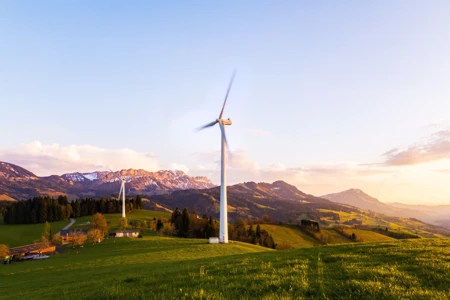Let’s take a look at what’s been accomplished so far, and how far we still have to go to ensure we’re making a real difference.
Net zero - are we on track?
In 2019, the government set a target to achieve net zero greenhouse gas emissions by 2050.1 This means that the amount of greenhouse gases emitted into the atmosphere will be balanced by the amount removed.
As a country, we’ve made significant progress towards this goal, with emissions falling by 44% from 1990 to 2020.2 However, there’s plenty that still needs to be done to achieve the target of net zero emissions. According to the Climate Change Committee, the UK needs to reduce its greenhouse gas emissions by at least 78% by 2035 to stay on track.3
Schemes, pledges and incentives
The UK government has launched various schemes and initiatives aimed at reducing our carbon footprint. For example, the government has pledged to ban the sale of new petrol and diesel cars by 20304, encouraging the transition to electric vehicles and placing the UK on course to be the fastest G7 country to decarbonise cars and vans.
Incentives for homeowners include the Green Homes Grant scheme, which provides funding for homeowners to improve the energy efficiency of their homes. The scheme covers up to two-thirds of the cost of eligible improvements, such as insulation and low-carbon heating.
The Smart Export Guarantee (SEG), which launched in 2020, allows homeowners in England, Scotland and Wales with specific renewable energy technology (such as solar panels) to receive payments for any surplus energy they generate and export back to the grid. This replaces the Feed in Tariff, which closed to new applicants in 2019.
Another incentive specifically aimed at current and prospective homeowners is green mortgages, which incentivise homeowners to make energy-efficient improvements to their properties. Green mortgages offer lower interest rates and more favourable terms to homeowners who make specific improvements to retrofit their properties, such as installing insulation or solar panels. This not only benefits the homeowner by reducing their energy bills, but also contributes in its own way to reduce the UK's carbon footprint.
The shift to renewables
Renewable energy is a crucial component in achieving net zero emissions, and the UK has made significant progress in this area - with 2020 marking the first year that electricity generation came predominantly from renewable energy sources.5
Offshore wind energy has been a significant contributor to the UK's renewable energy mix, with the country boasting the largest installed offshore wind capacity in the world. The government also set a target to increase offshore wind capacity to 40GW by 2030, aiming to provide enough energy to power every home in the UK.6
Solar energy has also seen significant growth in recent years, with solar panels being installed on homes, businesses, and farms. Biomass, hydropower, and tidal energy are also being developed as renewable energy sources, though there is still some way to go before these become more prominent in terms of usage.
Where do we stand?
On the whole, we as a nation are continuing to take steps towards a more sustainable future.
However, while considerable progress has been made towards achieving net zero emissions - particularly in terms of electricity generation - much more needs to be done to remain on track, with some even arguing that the urgency of the climate crisis is still not being taken seriously enough.
For instance, sectors such as transport and agriculture still have serious room for improvement in terms of their emissions output. While new policies and measures to address these areas are being pledged, it remains to be seen whether they will be sufficient enough to achieve the net zero target.
As homeowners, we have an extremely important part to play in contributing towards a greener future. This can be achieved in many of the ways highlighted in this article, from the more costly options of retrofitting, to opting for more energy-efficient appliances or renewable energy sources. Every little helps, and by playing our part, we can help contribute to a safer, more sustainable future for our planet.
If you’re interested in applying for a green mortgage for your property, get in touch with an adviser today.
Important information
Your home may be repossessed if you do not keep up repayments on your mortgage.
There may be a fee for mortgage advice. The actual amount you pay will depend on your circumstances. The fee is up to 1% but a typical fee is 0.3% of the amount borrowed.

